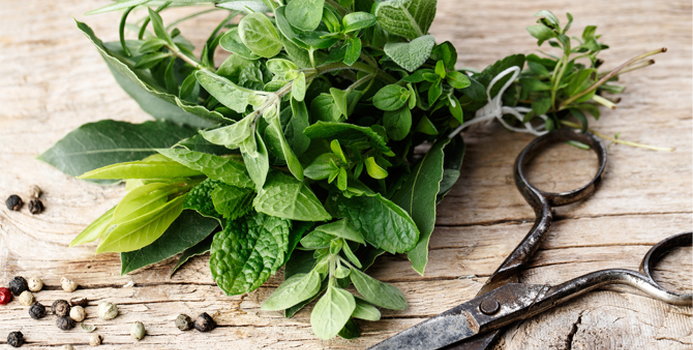Anyone trying to lose weight, or just eat healthier in general, knows that cutting calories is essential. Slashing calories from your diet is hard, especially with so many tempting high-calorie food ads splashed across your TV screen and a plethora of fast-food restaurants around every corner. No worries -- flavorful, colorful, delicious herbs can take your dishes to tasty new heights while keeping the numbers on the scale low.
Herbs shouldn't be relegated to the side of your plate as a lowly garnish, especially since their powerful polyphenols (components in plants that combat oxidative stress and inflammation) may help ward off cancer, type 2 diabetes, cardiovascular disease, and cognitive decline. Along with all of those health benefits, herbs' best attribute is that they are virtually calorie-free.
Basil
There are actually over 40 varieties of basil, and each has its own color, flavor, texture and shape. Basil does a lot more than just add color and intense flavor to your pasta dishes and pesto. Studies have shown that basil is a potent anti-inflammatory -- blocking cytokines, which cause inflammation, and their mediators. Additionally, basil's essential oils have been shown to reduce cholesterol, triglycerides, and blood sugar, which could prevent heart disease and diabetes. Basil's phenolic compounds, particularly flavonoids and vitamins A, C and E, may help prevent cancer. Basil can also protect us from food-borne illness because of its antibacterial, antifungal and antiviral properties.
Oregano
Oregano is killer! And by killer, I mean it kills both bacteria and fungus with two phytochemicals: thymol and carvacol. It also contains the potent antioxidant rosmarinic acid, which is correlated with a stronger immune system. Other components in oregano have been shown to combat upper respiratory infections as well as cancer. Oregano works well in Italian and Mediterranean dishes.
Parsley
This under-appreciated herb contains significant amounts of vitamin K, A and C. Parsley contains a flavonol myricetin, which in studies has proven to prevent skin cancer. Parsley also contains a hefty dose of chlorophyll, which can help inhibit the generation of heterocyclic amines -- cancer-causing compounds that are produced when you grill meat (charring it) at very high temperatures. Also, make no bones about it -- parsley can help protect your bones because of its high vitamin K content. Vitamin K helps improve calcium absorption. Don't relegate this herb to the side of your plate as a garnish. Toss freshly chopped parsley into your tomato sauces, seafood and poultry recipes, eggs, and roasted or mashed potatoes.
Dill
Dill may bolster your immune system with its high amounts of vitamin A and C. Bonus: vitamin A and C help keep your eyes and skin healthy. Additionally, dill's flavonoid quercetin can help reduce inflammation. Make your own veggie dip with nonfat yogurt, chopped dill, salt and pepper. Dill also pairs well with grilled salmon and other seafood dishes.
Cilantro
This Hispanic food staple is high in vitamin K, which is essential for bone health and brain health. Cilantro can also help relieve the symptoms of exposure to toxic chemicals such as mercury. Various studies cite cilantro's ability to reduce anxiety and insomnia. Cilantro is quite versatile -- toss it into salsas, salads, pesto, sandwiches, soups, pasta dishes, and grilled lean meat, fish, and poultry.
Rosemary
Rosemary contains a host of antioxidants, particularly those that fight inflammation. It also may improve cognitive functioning, bolstering memory and learning ability by helping increase acetylcholine production. Rosemary adds flavor to roasted chicken, turkey and potatoes.
Mint
Of course, when you think of mint, a refreshing mojito probably comes to mind, but there are so many other ways to use fresh mint. Toss some into a fruit salad, soup, chopped veggie salads or lamb dishes. Add a few mint leaves and cucumber slices to your water. Studies have shown that mint may help with digestive problems, especially irritable bowel syndrome. Research also shows that mint's rosmarinic acid aids with allergy relief. Brew up some mint tea when you get a cold -- the menthol in mint works as a natural decongestant.
Thyme
It's about time to include thyme! This lemony-tasting herb with small, tender leaves imparts a ton of flavor to your fare. Several studies show thyme exhibits the ability to lower blood pressure, protect you from colon and breast cancer and food-borne illnesses. Use thyme with beef, venison, chicken, lamb, pork, carrots, peas and soup.
Sage
Sage is all the rage when it comes to antioxidant content. Studies have shown that sage helps improve memory and may lower cholesterol and blood sugar. Pump up your pork and poultry dishes with sage.
Kari Hartel, RD, LD is a Registered, Licensed Dietitian and freelance writer based out of St. Louis, MO. Kari is passionate about nutrition education and the prevention of chronic disease through a healthy diet and active lifestyle. Kari holds a Bachelor of Science in Dietetics from Southeast Missouri State University and is committed to helping people lead healthy lives. She completed a yearlong dietetic internship at OSF St. Francis Medical Center in Peoria, IL, where she worked with a multitude of clients and patients with complicated diagnoses. She planned, marketed, and implemented nutrition education programs and cooking demonstrations for the general public as well as for special populations, including patients with cancer, heart disease, diabetes, Alzheimer's disease, obesity, and school-aged children.




